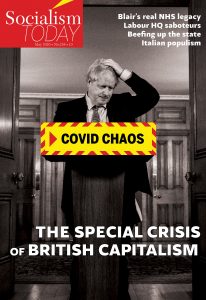The 2017 general election created another opportunity to carry through the transformation of Labour into a mass working class party fighting for socialist change. The following article by HANNAH SELL was published in the immediate post-election edition of The Socialist, issue No.952, 14 June 2017.
Theresa May’s failed election gamble is a nightmare for the capitalist class in Britain. Seven weeks ago most of Britain’s elite were hopeful that May would succeed in dramatically increasing the number of Tory MPs, thereby buttressing her government to be able to weather the storms of economic crisis, to carry out vicious austerity against the majority in society, and to implement a Brexit in the interests of the 1%.
Instead she is now a ‘dead prime minister walking’, only able to temporarily cling to power by leaning on the reactionary, sectarian Democratic Unionist (DUP) MPs, describing them as her ‘friends’ on the steps of Downing Street.
Read more